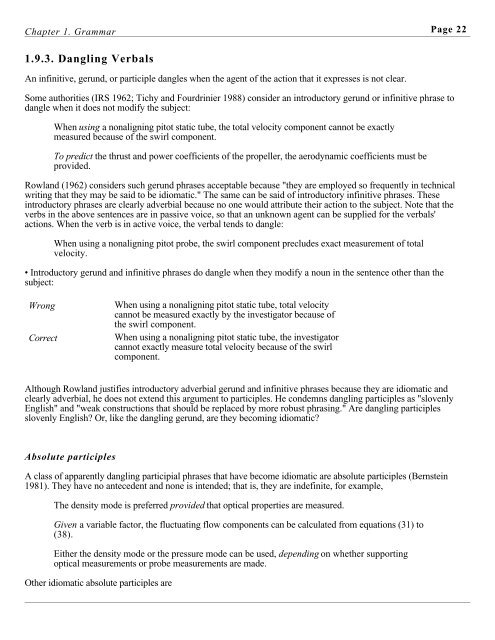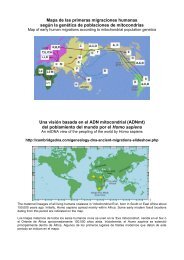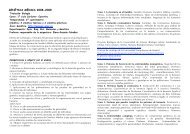Grammar, Punctuation and Capitalization - Handbook for Technical ...
Grammar, Punctuation and Capitalization - Handbook for Technical ...
Grammar, Punctuation and Capitalization - Handbook for Technical ...
You also want an ePaper? Increase the reach of your titles
YUMPU automatically turns print PDFs into web optimized ePapers that Google loves.
Chapter 1. <strong>Grammar</strong> Page 221.9.3. Dangling VerbalsAn infinitive, gerund, or participle dangles when the agent of the action that it expresses is not clear.Some authorities (IRS 1962; Tichy <strong>and</strong> Fourdrinier 1988) consider an introductory gerund or infinitive phrase todangle when it does not modify the subject:When using a nonaligning pitot static tube, the total velocity component cannot be exactlymeasured because of the swirl component.To predict the thrust <strong>and</strong> power coefficients of the propeller, the aerodynamic coefficients must beprovided.Rowl<strong>and</strong> (1962) considers such gerund phrases acceptable because "they are employed so frequently in technicalwriting that they may be said to be idiomatic." The same can be said of introductory infinitive phrases. Theseintroductory phrases are clearly adverbial because no one would attribute their action to the subject. Note that theverbs in the above sentences are in passive voice, so that an unknown agent can be supplied <strong>for</strong> the verbals'actions. When the verb is in active voice, the verbal tends to dangle:When using a nonaligning pitot probe, the swirl component precludes exact measurement of totalvelocity.• Introductory gerund <strong>and</strong> infinitive phrases do dangle when they modify a noun in the sentence other than thesubject:WrongCorrectWhen using a nonaligning pitot static tube, total velocitycannot be measured exactly by the investigator because ofthe swirl component.When using a nonaligning pitot static tube, the investigatorcannot exactly measure total velocity because of the swirlcomponent.Although Rowl<strong>and</strong> justifies introductory adverbial gerund <strong>and</strong> infinitive phrases because they are idiomatic <strong>and</strong>clearly adverbial, he does not extend this argument to participles. He condemns dangling participles as "slovenlyEnglish" <strong>and</strong> "weak constructions that should be replaced by more robust phrasing." Are dangling participlesslovenly English? Or, like the dangling gerund, are they becoming idiomatic?Absolute participlesA class of apparently dangling participial phrases that have become idiomatic are absolute participles (Bernstein1981). They have no antecedent <strong>and</strong> none is intended; that is, they are indefinite, <strong>for</strong> example,The density mode is preferred provided that optical properties are measured.Given a variable factor, the fluctuating flow components can be calculated from equations (31) to(38).Either the density mode or the pressure mode can be used, depending on whether supportingoptical measurements or probe measurements are made.Other idiomatic absolute participles are






